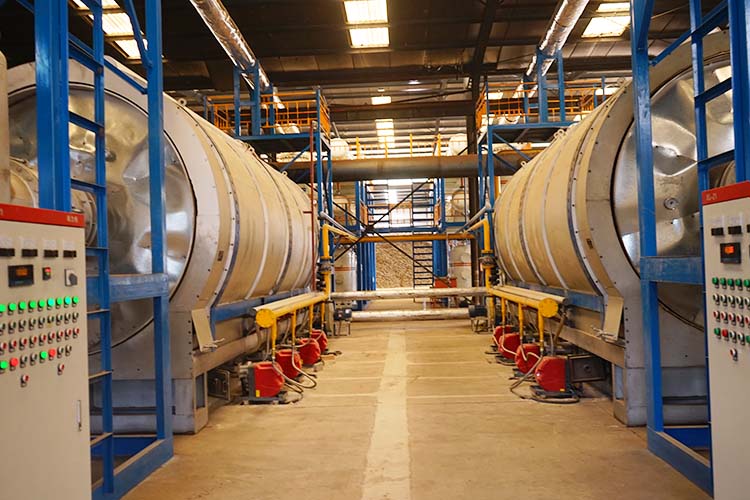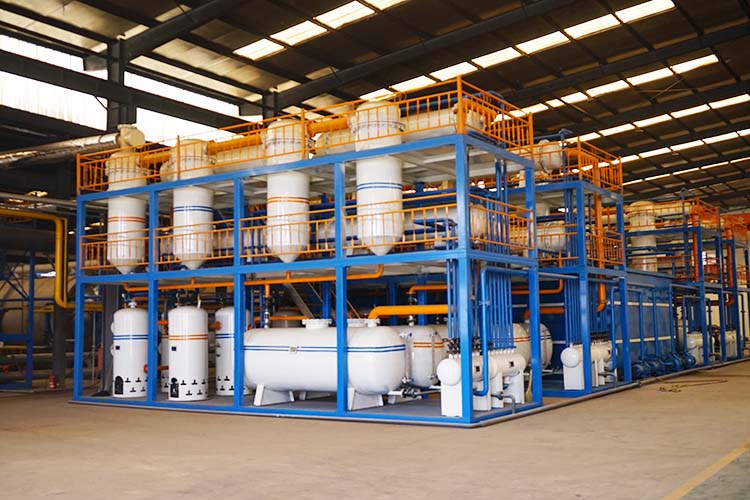As a great country in Central Asia, Kazakhstan's automobile parc keeps growing with the improvement of residents' consumption level and the promotion of road network construction in recent years. The huge car parc makes the production of waste and scrap tyres increase dramatically. It is estimated that the annual production of waste and scrap tyres reaches millions. However, the country faces numerous challenges in waste and scrap tyre disposal. At present, most waste and scrap tyres in Kazakhstan are arbitrarily stacked around cities and waste factories, which not only occupies a lot of valuable land resources, but also brings serious environmental hazards. In the high temperature period in summer, these stacked waste and scrap tyres are very easy to cause fire. In 2024, a large tyre stacking site outside Almaty catches fire and the big fire burns for several days, resulting in a serious impact on the surrounding air quality and a significant increase in the incidence of respiratory diseases of residents. However, the traditional landfill treatment is no longer applicable due to the prohibition of plastic waste landfill in Kazakhstan; Simple incineration will release a large number of harmful gases, such as sulfur dioxide, nitrogen oxide and polycyclic aromatic hydrocarbon, which will seriously pollute the atmospheric environment and run against the objective of Kazakhstan to pursue sustainable development and improve the quality of ecological environment. In addition, although Kazakhstan Ministry of Energy and other departments are cooperating in the treatment of solid waste, there is a lack of efficient, mature and environmentally friendly treatment technologies and schemes in the waste and scrap tyre sector, and it is urgent to introduce an innovative treatment mode.

Waste and scrap tyre refining facilities offer highly targeted solutions for the actual situation in Kazakhstan. Considering the instability of power supply in some areas of Kazakhstan, especially in remote towns and rural areas, the equipment is designed with low energy consumption, which can flexibly adapt to diesel power generation, wind power generation (Kazakhstan has rich wind energy resources, and some areas have good wind power conditions) and other power supply modes, so as to ensure the stable operation of the equipment under different power environments. In terms of transportation and installation, the equipment adopts modular design. Each core component can be split for transportation. It can be smoothly transported to each corner of Kazakhstan through railway, highway and other transportation ways. During installation, only simple leveling and hardening of the site are required, and no large-scale civil engineering is required, which greatly reduces the preliminary investment cost and installation difficulty. From the perspective of environmental protection, the equipment is equipped with an advanced tail gas purification system, which comprehensively uses desulfurization, dust removal, adsorption and other technologies to effectively remove the harmful components in the waste gas, so that the emission indicators fully comply with the requirements of environmental protection regulations of Kazakhstan, and eliminate the air pollution caused by the waste gas; At the same time, the whole production process adopts the full closed cycle process to realize zero discharge of wastewater, avoid damage to the local fragile water resources and soil environment, and strongly comply with the strict requirements of Kazakhstan on ecological environment protection.

From the perspective of economic value, the waste and scrap tyre refining equipment brings significant economic benefits and industrial development opportunities to Kazakhstan. Kazakhstan's industrial production and transportation have a huge demand for energy, and the fuel oil produced by the equipment has a high calorific value. It can be directly used as fuel in industrial boilers, power stations, transportation tools and other fields, effectively easing the tense situation of local energy supply, reducing the dependence on imported energy, and improving the energy security level. The high-quality carbon black produced can be widely used in rubber products, plastic products, inks and other industries to provide high-quality raw materials for relevant industries in Kazakhstan, help improve product quality and market competitiveness and promote industrial upgrading. In addition, the steel wire recovered in the refining process can be used as the high-quality raw material for steel smelting, and reprocessed by the local steel enterprises to create additional economic value. In addition, the equipment operation process is relatively simple. After 2-3 weeks of professional training, the local personnel can skillfully master the operation skills, thus creating a large number of jobs for the local, including waste and scrap tyre recycling, equipment operation, product sales and other links, driving the coordinated development of relevant industrial chains and promoting the local economic prosperity.

China Yongle Environmental Engineering Co., Ltd., with years of deep experience and strong technical strength in the field of environmental protection equipment, can customize a comprehensive and efficient waste and scrap tyre treatment solution for Kazakhstan. Based on the power supply situation, transportation conditions and waste and scrap tyre production scale in different regions of Kazakhstan, the Company can flexibly adjust the equipment configuration and launch various types of equipment with daily processing capacity ranging from 10t to 100t to meet the diversified demands from small recycling stations to large industrial processing centers. Considering the possible shortage of environmental protection technical personnel training in Kazakhstan, the Company provides a one-stop service system of "equipment installation+operation training+regular maintenance". Dispatch professional technical team to the local for equipment installation and commissioning to ensure the equipment is put into operation smoothly; At the same time, carry out system training for local operators and technical maintenance personnel to make them master equipment operation skills and daily maintenance key points, and reduce the later operation risks and maintenance costs of equipment. In addition, Yongle Environmental Protection also actively establishes close cooperation with local trade partners in Kazakhstan, builds a complete supply network of equipment parts, and sets up after-sales service stations in main cities such as Nuer Sudan and Almaty to quickly respond to customers' equipment maintenance and technical support demands and ensure long-term stable and efficient operation of equipment. Selecting Yongle's environmentally friendly waste and scrap tyre refining equipment means finding a green road for Kazakhstan that can not only effectively solve the problem of waste and scrap tyre pollution, but also realize resource recycling and promote sustainable economic development.
Yongle Environmental Protection is mainly engaged in the research and development, production and sales of complete sets of technical equipment for organic solid waste disposal and comprehensive utilization. Production and manufacturing, domestic waste treatment equipment, tire pyrolysis equipment, medical waste disposal equipment, hazardous waste disposal equipment, and achieve efficient and comprehensive utilization of resources through independently developed low-temperature anaerobic pyrolysis equipment technology solutions.
Tags:Problem of Scrap Tire Refining Equipment Breaking Kazakhstan Tire,waste tire refining equipment,YONGLE GROUP
 Latest news
Latest news


























